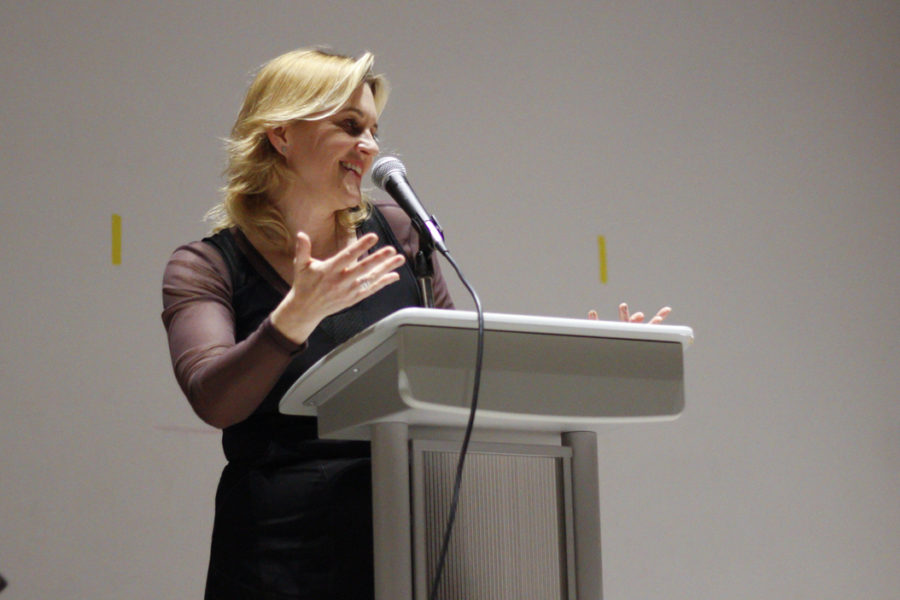A casual game of charades between A-list celebrities was the perfect opportunity for writer and editor Meghan Daum to transcend the line between being present and invisible.
Daum’s experience at a star-studded party as an aspiring screenwriter served as the premise for “Invisible City,” an essay in her recent book, “The Unspeakable,” Daum’s most recent collection of personal essays.
“I was, in effect, invisible. I was the human embodiment of a fly on the wall,” she said.
On Thursday night, the Alexandra L. Rowan Memorial Foundation and the Pittsburgh Contemporary Writers Series brought Daum to read excerpts from her 2014 work in the Frick Fine Arts auditorium as part of the Rowan Festival.
The Alexandra L. Rowan Memorial Foundation was created after 2013 graduate Alexandra Rowan, an English and communications double major, died suddenly from massive pulmonary embolism. Her parents now support writing students through internships, awards and seminars.
Each year, the foundation hosts a writing festival at Pitt. This year’s lineup includes a publishing Q&A, master classes taught by established writers including Daum and readings from Rowan Award winners.
David Rowan, Alexandra’s father, presented awards at Thursday’s event to students who excelled in creative writing. Abigail Wang, April Yoder and Juliette Rihl won awards and monetary prizes for their work in poetry, fiction and nonfiction, respectively.
Geeta Kothari, the writing festival’s director, introduced Daum by mentioning where her work has appeared, including The New Yorker, the New York Times Magazine and The Los Angeles Times, where she wrote op-eds for 11 years.
“I’m not sure when she sleeps, but I do know we’re very lucky to have her here with us tonight,” Kothari said.
Daum commanded the attention of the room, standing under the auditorium lights as she read about her first celebrity dinner party experience in Los Angeles that left her feeling invisible but with ample opportunity for observation.
“You could say I moved to Los Angeles in order to have a lot of things at once,” she began.
Daum’s tale of attending a dinner party hosted by illustrious writer and director Nora Ephron was a vehicle for her discovering her true passion.
Daum casually described, her tone lighthearted, receiving a fax with directions to Ephron’s house with instructions to create a list of related items for a “game.”
She admitted she spent 20 hours finalizing this list, which ended up consisting entirely of rock bands that had birds in their names. These lists were used during the party for a competitive game of charades.
Once at the party, she struggled to make conversation since asking her fellow dinner guests what they did for a living was out of the question.
She sat next to actress Meg Ryan, who turned away from her at dinner to speak to another neighbor about President George W. Bush’s then-recent election. She had more success with Steve Martin, who talked about his work for the “Pink Panther” remake.
Nicole Kidman, Arianna Huffington and Larry David were also among the celebrity population in attendance. Her interactions with each of them were not especially enlightening, since “no one listened to anyone.”
“One unspoken rule seemed crystal clear: do not speak about business,” she said.
Daum detailed her many attempts at conversation, eventually accepting that in the presence of such celebrities, it was difficult to be heard, even during her successful guessing in a game of charades.
“I entered a kind of zen space, a pact with my ego,” she said.
The celebrity charade experience, she claimed, was the only one she ever attended. After that, she realized screenwriting was not in her future.
“The screenwriting world was lively,” she said, adding that many in the community were, as she described it, desperate or sad, like students who are smart but not the smartest.
Daum answered questions for the remainder of the night, offering advice about writing, life and the redemption narrative.
She described the redemption narrative — a concept based on processing a crisis and becoming a “better person”— as “terribly reductive.” The expectation for people to come out of traumatic experiences “better” is unrealistic, because according to Daum, “life doesn’t work that way.”
“Isn’t the best possible outcome that you’re the same person at the end of [any] trauma?” she challenged.


